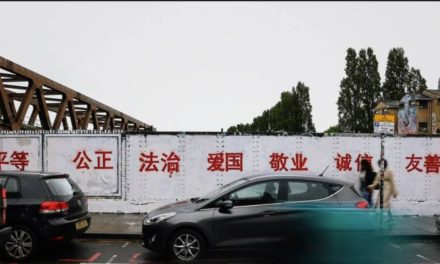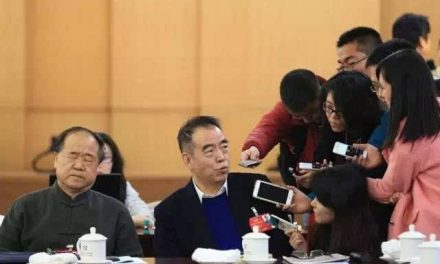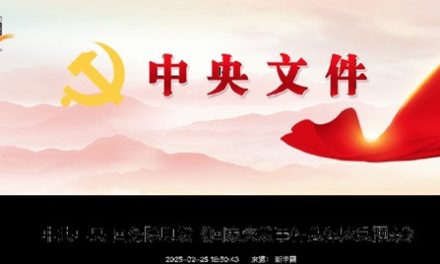By Lianchao Han and Jianli Yang
 On April 29, China’s Politburo held a meeting to review the country’s national talent strategy under the 14th Five-Year Plan and discuss the economic situation. This offers us a glimpse into the course China has chartered to compete against the United States during Xi Jinping’s third term after
On April 29, China’s Politburo held a meeting to review the country’s national talent strategy under the 14th Five-Year Plan and discuss the economic situation. This offers us a glimpse into the course China has chartered to compete against the United States during Xi Jinping’s third term after
Although the CCP began to implemthe 20th Congress of the Chinese Communist Party (CCP) to be held this autumn.
ent its talent-building strategy in 2002, it is Xi who has branded it a “core pillar” for China to achieve global economic dominance.
Last December, Qiushi, the CCP’s leading official theoretical journal, published a speech Xi delivered at the CCP’s Central Talent Work Conference in September 2021. In the speech, Xi laid out a strategy to make China a global talent and innovation hub, with a three-part timeline: by 2025, gather a large pool of strategic talent in key technology sectors, including first-class leaders and innovative teams in science and technology; by 2030, complete the formation of a system that can attract world-class talent and pioneers in critical and emerging technologies; and by 2035, gain a comparative advantage in international talent recruitment and become the world’s leading talent center.
The CCP believes that once the correct political line is set, China’s horde of ever-obedient cadres will be the determining factor for its success. Xi, a staunch follower of Mao Zedong’s communist politics, believes that China’s ability to ultimately “win” against the U.S. depends on whether it can overtake the United States’s lead in science and technology — which, in turn, boils down to winning the competition for talent. Xi recognizes that today’s society is marked by “changes unseen in a century” and that these unprecedented changes have given China the opportunity to rise swiftly as a dominant world power. He has brought the single-party state close to fulfilling its centenary goal of achieving the “Chinese dream of national rejuvenation” — a euphemism for China-centric dominance — if it can finish this last mile of “gather[ing] the brightest minds under heaven to serve China.”
This means that Beijing will accelerate the training of homegrown talent and the recruitment of talent from other countries, particularly in the West. Indigenous talent development can take many years, which China does have under Xi’s ambitious timetable, even though it has made great strides. Poaching and siphoning talent from the West, a strategy referred to as “overtaking on a sharp bend,” produces much faster results. This is why the U.S. must be vigilant of China’s global talent recruitment strategy.
In the 1950s, the CCP successfully lured hundreds of scientists and researchers from the West to return to China. These scientists built China’s atomic bomb in 1964 and hydrogen bomb in 1967. In 1970, they helped launch China’s first satellite into space. In 1999, to recognize the contributions of expats, the CCP awarded national medals of the “Two Bombs, One Satellite” project to 23 individuals who made significant contributions to the program. Eighteen of the recipients were scientists trained in the West, and most of them were U.S.-trained. Among them was mathematician, aerospace engineer and physicist Hsue-Shen Tsien. It is reported that a senior U.S. defense official stated, “I’d rather see him shot than let him go,” and claimed that Tsien was “worth three to five divisions anyplace.”
In the 2000s, China began to implement a strategy to systematically lure away more Chinese expats involved in high-level science and research. According to a U.S. Senate report, Beijing over the years has devised more than 200 talent recruitment plans, including the notorious Thousand Talents Program (TTP). Official data released by the Chinese government indicate that, as of 2016, the TTP alone had recruited 6,000 “high-level talents” and 53,900 “high-level ‘study-abroad’ talents” from overseas. Among them are Nobel Prize in Physics laureate Chen-Ning Franklin Yang and the late Andrew Yao, who received the Turing Award in 2000. The CCP even arranged for Yang, a wife more than 50 years his junior. To take advantage of America’s open and cutting-edge talent market, Huawei has set up booths in front of the headquarters of various U.S. tech giants to aggressively recruit talent.
Since Xi came to power in 2012, he has accelerated China’s talent programs despite U.S. concerns about the illicit transfer of American technology, intellectual property and know-how to China. The CCP’s recruiting operations have intensified, and become stealthier, in recent years. Beijing has shifted its focus from Chinese expats to foreign natives. The Chinese government has set up more than 600 overseas recruitment stations worldwide, including 146 in the U.S. and 46 in Japan. China successfully recruited professor Charles Lieber, former chair of Harvard’s Department of Chemistry and Chemical Biology, and enticed top Japanese scientist Akira Fujishima, an authoritative figure in the field of photocatalysis who has been nominated for the Nobel Prize several times, and his entire research team to move to China.
For the free world, the grave danger of Xi’s talent strategy is that China aims to reshape the global talent recruitment and retention landscape to achieve its ultimate goal of world dominance. Beijing uses the so-called “whole national system,” meaning pooling together China’s state power and resources, to implement the strategy. If China succeeds, talent recruited from the U.S. and other Western countries will provide not only a sustained technology transfer but also disruptive innovations that will enable China to surpass the U.S. economically, technologically and militarily.
The U.S. government must recognize that China’s talent recruitment ambitions are not merely aimed at strengthening the totalitarian state’s economy and workforce; they also constitute an aggressive effort to replace America’s global leadership. The Biden administration should formulate a more effective talent strategy, including adopting a more targeted immigration policy that appeals to the world’s best and brightest minds. Only then can the U.S. halt and reverse the ongoing brain drain and stop China from becoming a magnet that attracts and retains the world’s top talent.
Lianchao Han is vice president of Citizen Power Initiatives for China. After the Tiananmen Square Massacre in 1989, he was one of the founders of the Independent Federation of Chinese Students and Scholars. He worked in the U.S. Senate for 12 years as a legislative counsel and policy director for three senators.
Jianli Yang, a former political prisoner of China and a Tiananmen Massacre survivor, is founder and president of Citizen Power Initiatives for China and the author of “For Us, The Living: A Journey to Shine the Light on Truth.”
This article first appeared in The Hill on May 12, 2022.























